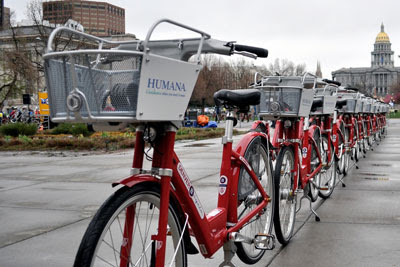What B-cycle taught us: Bike sharing in Denver is a must-have
Denver B-cycle’s launch as the first large-scale bikeshare in the U.S. was a game changer for our city. Bikeshare has proven to be an important mobility choice for people seeking options other than driving, and Denver B-cycle’s departure leaves a gap in our transportation system for residents, workers and visitors that will hinder mobility choices for an unknown amount of time. The Denver Streets Partnership (DSP) is concerned about the loss of mobility choices in Denver, and we urge the City to work quickly to fill this gap and ensure the sustainability of bike share in Denver.
While there is an obvious role for the private sector and Denver should encourage market innovation, we believe public funding for bike share is critical for long-term success.
Denver B-cycle has been a success
Denver B-cycle, run by nonprofit Denver Bike Sharing, has served hundreds of thousands of Denverites and visitors since its launch. It has been an asset to Denver’s transportation system and become an iconic part of our city.
Between launching on April 22, 2010 and December 31, 2018, B-cycle saw:
- 500,437 total memberships
- 2,519,553 trips taken
- 5,348,388 miles ridden (that’s nearly 215 trips around the equator, or 11 trips to the moon and back)
- An average of more than 1,000 trips per day on the fleet
As the nation’s first large-scale bike sharing system, Denver B-cycle established Colorado’s capital as an early leader in providing mobility choice for people in the city, and doing so with trusted partnerships and community engagement. After its rollout, city leaders from around the U.S. looked to Denver as the model to follow, with more than 75 bike share systems launching and expanding in all corners of the country.
Denver B-cycle has also been integral in moving Denver closer to achieving our city’s goals for a more sustainable, healthier transportation system.
- An estimated 41% of Denver B-cycle trips replaced motor vehicle trips and 28% of trips were paired with transit, moving Denver closer towards its goal of reducing single-occupant vehicle commuters to 50%.
- An estimated 9,405,100 pounds of CO2 emissions (the equivalent of that of 10,430,517 miles driven by a passenger vehicle) were avoided as a result of trips taken using Denver B-cycle, helping us protect our climate, improve public health and increase Denver’s ability to reduce greenhouse gas emissions by 80% by 2050.
- Since 2010, Denver B-cycle has offered subsidized annual memberships to low-income residents and free annual memberships for 2019 through the recent 5280 Free Rides program, both of which helped eliminate barriers and increase access to smart technologies and mobility services for everyone.
The City now needs to act quickly to find a replacement for Denver B-cycle so that Denver’s residents, workforce and visitors to the city have access to reliable mobility choices and don’t feel driving is their only option for getting around.
Bike share funding sources
Like many traditional bike-sharing organizations in the U.S., Denver Bike Sharing worked hard to align the right mix of public funding, private sponsorship, and membership fees to provide accessible and convenient rides for all users. Even with very high rider satisfaction, they faced many of the same challenges as other cities with bike sharing, such as an aging system, loss of a title sponsor, and restrictions on public funding.
With innovations in bike share technology and new companies working to provide mobility options around the country, DSP believes Denver has the same opportunity to lead right now as it did in 2010 when it helped to launch the system. The opportunity is a timely one, as voters just approved city charter changes allowing the new Department of Transportation and Infrastructure to provide transportation systems for all modes.
To chart a course for the future, Denver should look at cities like Chicago, Los Angeles and Memphis, which have recently re-upped their investment of public dollars in their bike share systems. These allocations of consistent and dependable funding have allowed cities to expand service to meet a broader segment of the population and update equipment to make sure fleets remain safe and reliable.
Denver can be a transportation leader
We want Denver to continue to lead when it comes to transportation choices. The Denver Streets Partnership is sad to see the flagship brand of B-cycle leaving the Mile High City, but we are optimistic about the future of bike sharing in Denver because Denverites clearly want bike options in our transportation system. City leadership has also been clear that mobility options are a top priority for them, and now should act fast to ensure reliable, equitable mobility choices for everyone in Denver.
Media contacts
| Piep van Heuven Policy Director Bicycle Colorado piep@bicyclecolorado.org 303-417-1544 ext. 108 |
Jack Todd Communications and Policy Manager Bicycle Colorado jack@bicyclecolorado.org 303-417-1544 ext. 105 |

